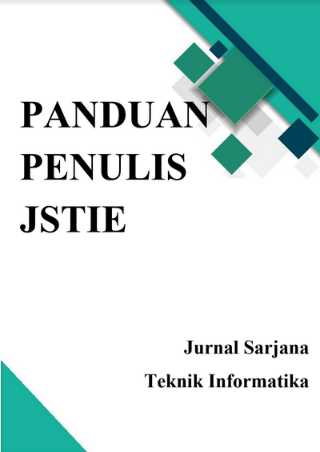E-READINESS PEMBUATAN MODEL SISTEM M-GOVERNMENT (STUDI KASUS PEMERINTAH KOTA YOGYAKARTA)
DOI:
https://doi.org/10.12928/jstie.v1i2.2557Abstract
Pada penelitian ini akan membahas tentang kesiapan masyarakat sebagai pengguna utama layanan publik sesuai model sistem M-Government sebelumnya. Karena masih banyak sistem di pemerintahan yang belum di gunakan dengan baik disebabkan oleh salah satunya SDM (Sumber Daya Manusia) yang kurang. Belum adanya pengecekan kesiapan masyarakat dalam menerima sistem baru yang dibangun dan dilaksanakan oleh pemerintah.
Pengecekan kesiapan dilakukan dengan menyebar kueisioner pada masyarakat sampel yaitu masyarakat Warungboto. Serta kepada ketua RW, petugas kelurahan Warungboto dan petugas kecamatan Umbulharjo. Pengecekan ini meliputi pengetahuan layanan, penerimaan TIK, kesediaan alat dan pengaruh budaya terhadap TIK. Kuesioner kemudian di uji dengan uji validitas, uji reabiliitas. Kemudian di ukur prosentase dari masing-masing pertanyaan dan pernyataan. Setelah itu dibuat model pengukuran untuk masyarakat Warungboto dengan menguji regresi berganda, untuk mengetahui nilai dari masing-masing kesiapan.
Dari hasil penyebaran kueisioner dan wawancara di peroleh hasil yang baik. Yaitu, masyarakat memiliki kesiapan sebanyak 32,4 % pada pengetahuan layanan pada pemerintahan, 75,9 % pada penerimaan TIK, 9,7 % pada kesediaan alat dan 11,2 % pada pengaruh budaya. Kesimpulannya adalah masyarakat sudah siap untuk ikut serta dalam implementasi dan perubahan sistem menuju M-Government. Tetapi kesediaan alat belum siapa, karena masyarakat belum memiliki smartphone. Perlu adanya alternatif lain untuk mensukseskan implementasi model sistem M-Government yaitu pembuatan aplikasi dalam bentuk dua handphone. yaitu smarthphone dan handphone support java.
Kata kunci : E-Readiness, model, sistem M-Government.References
Indrajit, Richardus Eko., (2002), Electronic Government Strategi Pembangunan dan Pengembangan Sistem Pelayanan Public Berbasis Teknologi Digital, Andi, Yogyakarta.
Sambiring, Krisantus., (2006), Penerapan Mobile Government di Indonesia, Karya Tulis, Institut Teknologi Bandung.
Wijaya, Stevanus Wisnu, (2006), Kajian Teoritis : Model E-Government Readiness Pemerintah Kabupaten/Kotamadya dan Keberhasilan E-Government, Karya Tulis, Institut Teknologi Bandung.
AL Fatah, Hanif., (2007), Analisis dan Perancangan Sistem Informasi unuk Keunggulan Bersaing Perusahaan dan Organisasi Modern, Andi, Yogyakarta.
Nugroho, Heru., (2011), Pembuatan Model Sistem M-Government, Universitas Ahmad Dahlan, Yogyakarta.
Jogiyanto HM, (2007), Model Kesuksesan Sistem Teknologi Informasi, Andi Offset, Yogyakarta 55281
http://cyber.law.harvard.edu/readinessguide/forward.html, Readiness for the Networked World ( A Guide for developing countries) di akses pada 07 April 2012
Riwidikdo, Handoki, (2010), Statistika Kesehatan, Nuha Offset, Yogyakarta.
Sugiyarto, (2011), Statistika Penelitian Menggunakan SPSS 17 Edisi Pertama, MIPA UAD PRESS, Yogyakarta
Nazir, M. (2003). Metode Penelitian. Jakarta: Ghalia Indonesia.
Downloads
Published
Issue
Section
License
License and Copyright Agreement
In submitting the manuscript to the journal, the authors certify that:
- They are authorized by their co-authors to enter into these arrangements.
- The work described has not been formally published before, except in the form of an abstract or as part of a published lecture, review, thesis, or overlay journal. Please also carefully read Journal Posting Your Article Policy.
- The work is not under consideration for publication elsewhere.
- The work has been approved by all the author(s) and by the responsible authorities – tacitly or explicitly – of the institutes where the work has been carried out.
- They secure the right to reproduce any material that has already been published or copyrighted elsewhere.
- They agree to the following license and copyright agreement.
Copyright
Authors who publish with Jurnal Sarjana Teknik Informatika agree to the following terms:
- Authors retain copyright and grant the journal right of first publication with the work simultaneously licensed under a Creative Commons Attribution License (CC BY-SA 4.0) that allows others to share the work with an acknowledgement of the work's authorship and initial publication in this journal.
- Authors are able to enter into separate, additional contractual arrangements for the non-exclusive distribution of the journal's published version of the work (e.g., post it to an institutional repository or publish it in a book), with an acknowledgement of its initial publication in this journal.
- Authors are permitted and encouraged to post their work online (e.g., in institutional repositories or on their website) prior to and during the submission process, as it can lead to productive exchanges, as well as earlier and greater citation of published work.







